Rolling back Roe v Wade: How Louisianans lost abortion access
There were only three clinics left in the state. As they now shutter, Louisianans will be some of the furthest from abortion access in the United States.
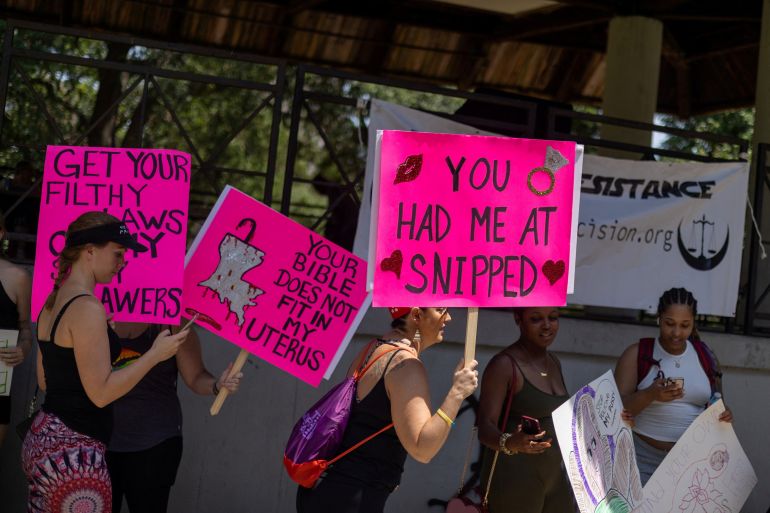
New Orleans, United States – Jen* had been sitting outside the New Orleans Women’s Health Care Center for an hour. It was 34°C (93°F) on a Monday afternoon in mid-June, and as Jen, who is in her 40s, waited on a shaded bench for someone to answer the door, she scrolled through her phone, trying one number after another. She wasn’t there as a patient, but as a mother: she wanted to make an appointment for her daughter, who just found out she is 14 weeks pregnant.
At this stage of pregnancy, her daughter would require an in-clinic abortion. Dressed in a tan jumpsuit, Jen ticked off her few options, sounding steady and pragmatic. “Baton Rouge doesn’t have anything until the 24th.” Eleven days away. She had no way to know it then, but that would be the day abortion access ended in Louisiana. “Same with Shreveport.”
Keep reading
list of 4 itemsTen years after Chibok girls kidnapping: One woman’s struggle to move on
Poland lawmakers take steps towards liberalising abortion laws
Arizona’s top court allows near-total 1864 abortion ban to go into effect
She was waiting for someone to answer the clinic’s locked front door to see if there were any openings. And that was it. Those were all her options in Louisiana, a southern state where legislation had impeded access to abortion for years – long before the monumental US Supreme Court opinion to overturn the 1973 Roe v Wade ruling on Friday, June 24. Since the 1973 ruling – which enshrined the right to access abortion care – Louisiana had passed 89 abortion restrictions, more than any other US state. Just three abortion clinics remained for the entire state of 4.6 million people.
As she waited, Jen began searching for help further away. She called a clinic in Houston, Texas, a five-hour drive west. “How late in a pregnancy do you take abortions?” she asked them. Texas, too, got crossed off. After September 2021, the state only allowed abortions up to six weeks. That was another reason why the clinics in Louisiana were so overwhelmed – patients from Texas were coming here for abortions.
Jen pushed her waist-length braids behind her shoulder and tried calling the New Orleans clinic’s front desk again. It was just a few feet away, on the other side of the door, but she hadn’t gotten through all day. She had been trying since Friday.
The small alcove where Jen sat showed signs of the lengths staff members had gone to protect patients from harassment by anti-abortion protesters who regularly gathered outside.
Jen first had to pass through a wrought-iron gate, typically locked from inside. A security camera pointed down at her from the corner. A stretch of cloth blocked her from the view of any passerby or protester. On some days, a security guard was on site, armed with a gun in a holster. Past the locked dark glass front door, more than a dozen patients slouched in plastic chairs. Some had been waiting for hours to be seen.
Jen’s call went to the answering service. Finally, as she stood, the clinic’s administrator stepped out. But it wasn’t good news.
“There are no appointments available,” the woman, Shemka Russell-Brown, told Jen gently. “We’re booked up through the end of the month.”
When asked if there were any other options, Russell-Brown suggested Fort Lauderdale, Florida.
And so, with every Louisiana clinic full, Jen would have to find the time and money to drive herself and her daughter more than 13 hours to the Atlantic coast of Florida. She left, calling her daughter, her voice softening as she prepared to deliver the news: “Hi, Sweetie,” she began, and walked out into the heat.
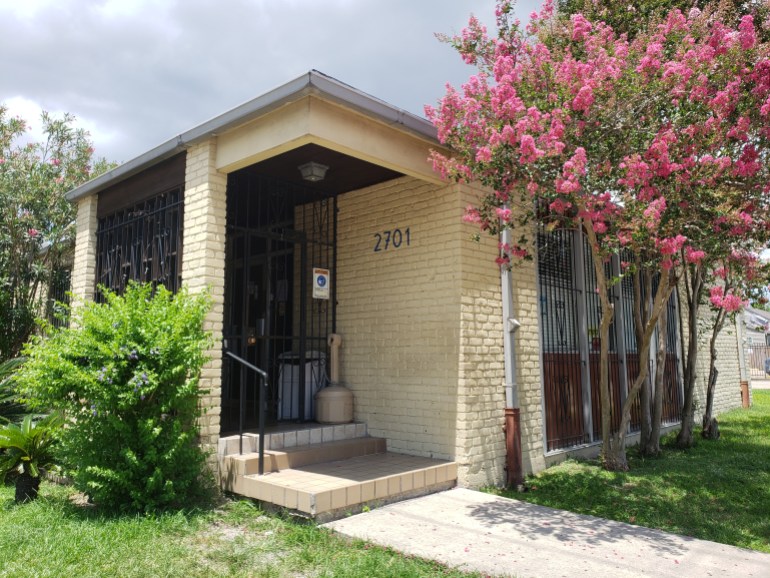
From few options to none
In early May, Politico leaked a draft of a Supreme Court opinion overturning the landmark Roe v Wade ruling. Hundreds of thousands of people protested the decision. Then on June 24, the Supreme Court overruled Roe v Wade, ruling that the legality of abortion is up to individual states to legislate.
Louisiana was one of 13 US states with a “trigger law,” meaning legislation was already in place that, with the fall of Roe v Wade, instantly made abortion illegal throughout the state. Louisiana’s law allows no exceptions for rape or incest. Trigger laws in every surrounding state – Mississippi, Arkansas, Oklahoma, and Texas – will soon make abortion illegal there as well.
On June 21, Louisiana Governor John Bel Edwards signed into law a bill that further bans abortion from the moment of “fertilization and implantation” and imposes criminal penalties of between one to 15 years in jail for any doctor who provides one. There is an exception if the pregnancy threatens the woman’s life, or if the foetus would die soon after birth; in such cases, two physicians need to diagnose the procedure as necessary. Since physicians administering abortions could risk jail time if an abortion is deemed unnecessary, advocates and experts worry the requirement will lead to more women’s deaths as hospitals consult attorneys and government officials to determine the legality of an abortion.
Legislators in Louisiana cite electoral pressure to be anti-abortion absolutists. Louisiana’s handful of politicians who do support abortion rights risk blowback from powerful anti-abortion lobbies like Louisiana Right to Life. New Orleans City Councilmember JP Morrell has been quoted in local outlet Gambit saying “the safer vote is to always vote against reproductive rights”.
Louisiana Attorney General Jeff Landry has said women wanting an abortion should “pack your bags and move to California”, even though a survey in April by Louisiana State University (LSU) researchers shows 46 percent of Louisianans favour abortion being legal in most or all cases. Governor Edwards, a Democrat, has said he is anti-abortion due to his Catholic faith, though he would prefer there be exceptions for rape and incest.
The state’s three remaining clinics had survived until now despite decades of increasingly baroque abortion restrictions in Louisiana that have closed over a dozen other sites. Back in 1992, there were 17 abortion clinics in Louisiana. Then there were eleven. Then five. Then three. Burdensome legislation even included specifications about procedure room size. The state health department could also immediately close a clinic if it violated any state law, including small paperwork violations. In fact, an inspector from the Louisiana health department was visiting the New Orleans clinic on the day Jen went; Russell-Brown said this was a common occurrence.
For her part, Russell-Brown, who spoke to Al Jazeera two days before the decision to overturn Roe v Wade was announced, was optimistic. Soft-spoken and enormously busy, she stepped briefly through the clinic’s back door – underneath another security camera – to say that she wasn’t worried about the impending overturn.
“I don’t think it will happen,” she said, calmly, with the ghost of a smile. “That’s what my gut tells me.” For their part, clinic staff were continuing on as normal and were not making any preparations for the expected ruling, she said, before stepping back through the unmarked door.
With Roe v Wade now overturned, Louisiana’s last three clinics will likely close their doors. When that happens, New Orleans will be one of the cities physically furthest from any legal abortion clinic in the US.
With the trigger law “effective immediately” following the Supreme Court decision, abortions became illegal in Louisiana as of Friday morning.
A staff member who answered the phones of the New Orleans clinic an hour after the ruling said they were not performing nor scheduling any more abortions. At the Shreveport clinic, a staff member who wished to remain anonymous said they would continue to do initial consultations, but they were no longer performing abortions. The staff member said that they had not had time to administer patients’ medication abortions that morning before the ruling was released at 9am. As she explained that she had been in charge of calling that day’s patients to tell them their appointment was cancelled, she began to cry.
Not in the patient’s best interest
Simi Mittal was 26 when she visited the clinic in New Orleans. She was waiting on an acceptance to medical school when she and her partner discovered she was pregnant. Simi knew abortion was the right decision for her. She made an appointment and drove to the brick building, which lies on a residential street.
“It’s an unmarked building. It’s not publicised or advertised,” Simi, now 31, recalls.
The couple was “greeted with protesters shoving absolute garbage propaganda into my hands. The images are so grotesque and falsely exaggerated … I remember them saying, ‘We can help you with diapers!’ And I just thought that that was comical, at best. Because raising a kid requires more than just diapers.”
Though the protesters weren’t present in mid-June 2022, when Jen waited outside the clinic, the week before her visit, eight were standing on the corner directly outside the front door, holding metre-high signs that read “Let Your Baby Live” and “THERE IS LIFE IN YOUR WOMB”. Two men – one in a suit, one in a T-shirt reading “Pro Life Apostalate” – began reading aloud from the Bible. A patient wearing a yellow sweatshirt despite the heat, hood cinched tightly to hide her face, picked her way around the protesters to get to the front door.
Until June 24, abortions were legal in the state up to 22 weeks gestation. But the restrictions in place made accessing an abortion a difficult and anxiety-ridden experience.
Abortion providers were required to do an ultrasound, describe it, and offer for the patient to hear the “heartbeat”, although before eight weeks an embryo typically does not have an audible heartbeat but rather electrical signals in a clump of cells. Providers had to read patients an “informed consent” script that, among other things, tells women that “by 20 weeks gestation, the unborn child has the physical structures necessary to experience pain.”
The script-reading, Simi says, lasts about five minutes, which feels like a very long time “when you’re sitting there, anxious, having the script read to you just because it’s a requirement”.
According to a study in the Journal of Health Politics, Policy and Law, nearly one-quarter of the foetal development statements in Louisiana’s informed consent booklets are “medically inaccurate”. Experts say these requirements are a violation of medical ethics, which require healthcare delivery to be evidence-based and respectful of patient autonomy.
Simi found the experience emotionally taxing. As a healthcare professional, she questioned the utility of requiring doctors to describe the ultrasound and have the patient listen to it. “I’m not sure what purpose it serves beyond attempting to make [a patient] feel guilty or have some sort of negative feelings associated” with her choice, she says.
Making women engage with the ultrasound is not about acting in the patient’s best interest, Simi says. It must be difficult too, she adds, for the physicians providing abortions. “You just want to get your patient the care they’re choosing to have, and you have to jump through all of these unnecessary hurdles.”
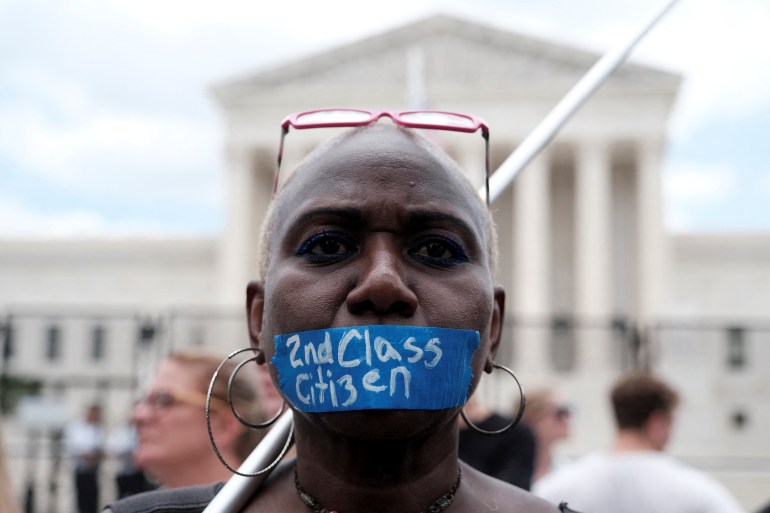
Figuring out access
Helen*, 34, found herself unexpectedly pregnant four years ago, shortly after moving to New Orleans to work in law.
“I had no idea what to do,” she recalls in a phone interview. First, she looked up Planned Parenthood, the reproductive healthcare non-profit and de facto abortion provider in many states. But while Planned Parenthood in Louisiana does provide services like STI treatment and HIV services, it did not offer abortions. Despite attempts since 2014 to secure a licence to perform abortions in Louisiana, Planned Parenthood had not been granted one.
“I was pretty scared, especially once I found out Planned Parenthood couldn’t help at all,” Helen says. “I just started Googling. But it was really hard to figure out where in Louisiana you could access an abortion.” She kept winding up on anti-abortion websites. “I’m religious. I don’t have a problem with religion. But there are these fake links that take you to religious, pro-life websites.”
One such site is the Woman’s New Life Clinic (not to be confused with the abortion provider, Women’s Health Care Center, six blocks away). Located right next to the local Planned Parenthood, the clinic says on its website that it offers “trustworthy and compassionate help when faced with the challenges of an unplanned pregnancy”. But under the page for “Abortions,” it warns that abortions are “permanent and serious … you will suffer the effects if anything goes wrong.”
Abortion-rights supporters say that confusion and misinformation have long been weaponised by anti-abortion policymakers in the US. They point, for example, to Texas’s so-called “Heartbeat Act,” which bans abortion after six weeks, and which they say bears a misleading title since an embryo has no heartbeat at that stage. In a brief to the Supreme Court, reproductive justice advocates condemned Louisiana laws which, “by falsely suggesting that abortion is uniquely unsafe … create stigma and a false aura of illegality.”
This stigma, which only added to the anxiety and fear of women who have received legal abortions in Louisiana, has also contributed to attacks on clinics in the past.
Dr Calvin Jackson, who performed the first legal abortion in New Orleans in 1973 and financed the construction of the now-shuttered Orleans Women’s Clinic, was stabbed outside his clinic by an anti-abortion activist in 1996. Jackson survived 15 stab wounds and continued to practice. Clinics in Baton Rouge were set on fire in 1985; three now-shuttered clinics in New Orleans were attacked with acid in 1998.
The way the remaining clinic was unmarked and unpromoted, Simi noted, “it seems like the state has a lot of shame for women that need to access those services.”
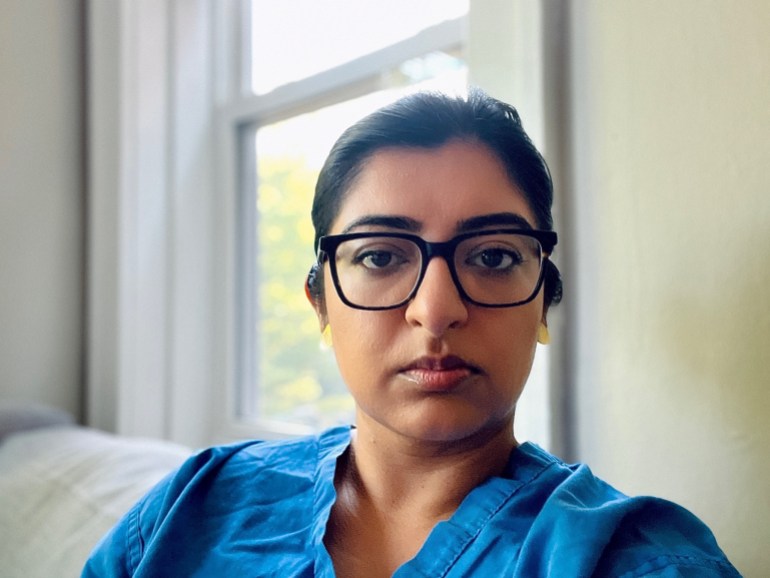
‘I would be stuck’
Helen and her partner made dozens of back-to-back calls trying to reach a Louisiana clinic, but couldn’t get through. “I was very scared that I was going to get past the point that it would be legal. And then I would be stuck,” she says.
She managed to reach the Delta Clinic of Baton Rouge, 125km (78 miles) north of New Orleans. She begged them for an appointment. “I didn’t know how many weeks I was pregnant – so they squeezed me in on a day that they were, I think, already full. My whole experience is that they were just overworked and overburdened and totally slammed.”
A medication abortion requires two pills (PDF). The first, mifepristone, stops the pregnancy from continuing. The second, misoprostol, usually taken a day later, makes the womb contract and bleed, like a miscarriage. The Baton Rouge clinic told Helen that, due to restrictions in Louisiana, she’d need to make two or three separate visits to the clinic: first for the required ultrasound; then again after the 24-hour mandatory waiting period, to get prescribed the two pills; and then again for a recommended follow-up. The use of telemedicine to provide medication abortions is banned in Louisiana.
When Helen and her partner went to Baton Rouge for her first appointment, her boyfriend was not allowed to join her inside, so he waited for six hours in the car. The waiting room was “jam-packed with women from all different backgrounds”, Helen says. Patients’ phones died as they waited for three, four, five hours; staff came around and handed out some donated candy.
“There was sort of a feeling of solidarity,” Helen recalls. Some of the women joked and chatted. Many around her mentioned having to go back to work later that day after their procedure or having taken time off work to come to the clinic. “The unspoken feeling was very much that everyone had really sacrificed a lot to be there and was stretched thin,” she says.
Past simply getting through the front door, patients already faced plenty of other logistical barriers. Helen could afford the $700 out-of-pocket cost and was able to take a day off work. Other women may not be able to, especially now that they will have to travel much further out of state. A legal second-trimester abortion, like the one Jen’s daughter needs, averaged $850 in Louisiana.
State and federal restrictions meant that Medicaid, insurance for low-income people, and insurance plans offered under the Affordable Care Act did not cover abortion care in Louisiana. Women who cannot afford an abortion, or who, like Jen, needed to pay for travel and overnight accommodation, can still seek support from places like the New Orleans Abortion Fund (NOAF), a non-profit that connects women seeking a termination to financial resources and relies entirely on donations.
Helen found the ultrasound “intentionally coercive”. Though providers must administer and describe it, patients don’t have to turn their heads and look. She chose not to. “Everyone who gets an abortion knows exactly what they’re doing and the decision they’re making,” she says. “So to try to make that choice harder for a woman – or to coerce her out of getting an abortion by making her listen to the heartbeat and look at the ultrasound – feels wrong and unethical.”
By her third visit, Helen had learned to park as close as possible to the clinic’s front door in order to avoid protesters who would try to talk to her and her boyfriend. One woman would ask if she could hug her. “It was obviously intended to guilt-trip me,” she says, adding that while she was comfortable with her decision, the protesters made the experience harder.
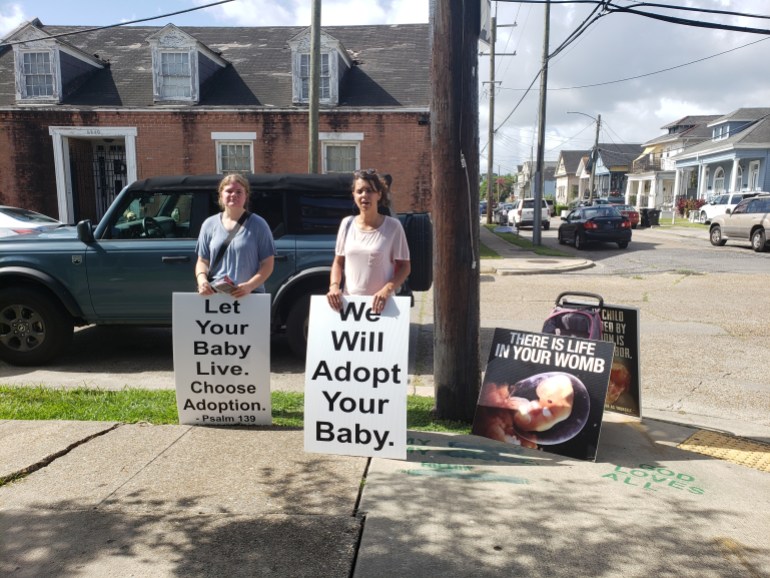
Who gets most affected
With Roe v Wade overturned, the effects will be felt most keenly by people of colour: they make up 42 percent of women in Louisiana, but 72 percent of those receiving abortions.
Louisiana is ranked the second-to-worst state for maternal mortality in the US – the country with the worst maternal mortality rate among the world’s developed nations. According to a document prepared for the state legislature by the Louisiana Department of Health, “in Louisiana, four black mothers die for every white mother and two black babies die for every one white baby.” Abortion was, in contrast, “extremely safe in Louisiana…compared with childbirth”, according to a Louisiana district court ruling.
Experts suggest that high maternal mortality is one of the impacts of centuries of structural racism on healthcare, something that Louisiana lawmakers have dismissed.
Jen, Helen, Simi, and Russell-Brown are all women of colour. And each woman is now helping other women get abortions. Jen is helping her daughter. Helen makes an effort to talk about her abortion among friends in order to normalise the experience and help others navigate access. Simi got accepted to LSU’s medical school and, her interest sparked by her own clinic experience, pursued a concentration in women’s health. She recently moved to Missouri to begin her residency in obstetrics and gynaecology (ob-gyn). Her residency there will include training from the Ryan Program, which works with ob-gyn residencies to integrate routine training in abortion care.
Patients in Louisiana who managed to access legal abortions did so thanks to a few crucial footholds: a car, a partner, a steady job. But with Roe v Wade struck down, women will need much more. The Guttmacher Institute, a research organisation that supports abortion rights, warned that “those with limited resources will depend increasingly on volunteer networks and nonprofit organizations to help with practical support such as travel, lodging, meals, and childcare.” Childcare in particular will be an acute need, as more than half of abortion patients are already parents. People from southern Louisiana will likely have to miss work, raise funds, and travel 1,100km (684 miles) north to Granite City, Illinois in order to receive in-person abortion services.
There were other safe, legal avenues for Louisiana women seeking an abortion until the 10th week of pregnancy. The non-profit Aid Access offers abortion pills by mail. The organisation says that since 2018, it has provided abortion pills to more than 30,000 Americans, and after the Roe opinion leaked, demand tripled.
Aid Access mailed the pills to Louisiana via an Indian pharmacy in a process that takes one to three weeks. But on June 17, Governor Bel Edwards signed into law a bill that will criminalise the sale of mail-order abortion medication.
People prescribed the abortion pill after 10 weeks should take it under medical supervision, and typically get painkillers, oxygen, and gas, for the acute pain and bleeding that lasts an average six hours. Sometimes it goes on overnight or requires a procedure under anaesthetic. None of this will be available to women who self-induce now that abortion is illegal here.
With clinics closed, Simi worries about how women may choose to terminate their pregnancies. “I would not be surprised if we saw an uptick in ER room visits as a consequence of women needing to take matters into their own hands,” she says.
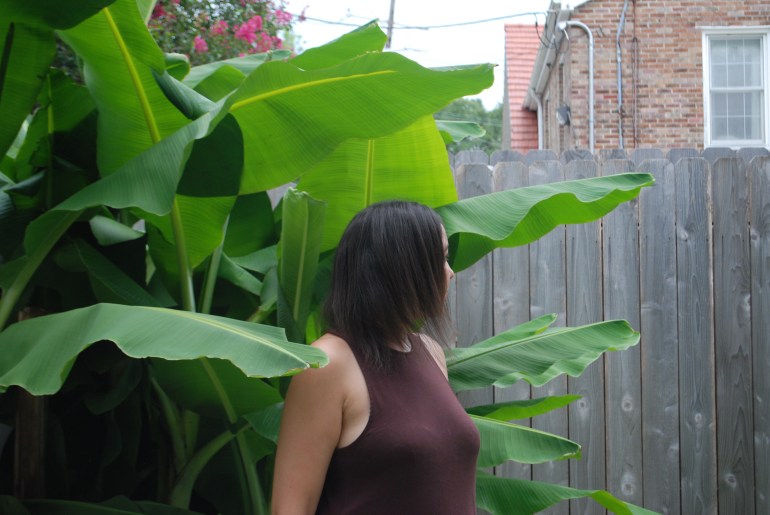
Clinics’ last days
Simi’s experience at the New Orleans clinic is what provoked her interest in becoming an OB-GYN. “It requires such sensitivity and vulnerability and compassion,” she says, “I saw those same qualities in the physician that was helping me. And I was like: I think I could do this.”
Originally from Mississippi, Simi says the availability of abortion services greatly influenced which residency she sought and why she decided on one in Missouri. “That was very important to me, coming from abortion-hostile states.”
At the time Simi spoke, abortion was legal in Missouri up to 22 weeks gestation. But Missouri, too, has a trigger law, and abortion is now illegal there.
She doesn’t know how Roe v Wade’s overturn will affect her residency or training.
She has already run into this contradiction to some degree in Louisiana. While both LSU and her school in Missouri offer an abortion-integrated training programme, she says it’s a challenging climate, because “you can get the training, but it’s not widely offered to patients. It’s like, what are we going to do with that training? If we have no clinics?”
In some cases, already, women were being forced to advocate for themselves, having to fight just to get legal prescriptions filled.
After her second appointment, Helen drove back down from Baton Rouge and went to a New Orleans pharmacy to fill her prescriptions. She had already taken the first pill at the clinic that morning; the doctor had instructed her to take misoprostol, the second abortion pill, and a painkiller that same evening.
The pharmacist refused to fill the prescriptions.
Helen argued with him. “By that point, after driving back, it was pretty late at night. So I was getting very, very scared that I wasn’t doing to be able to get the second pill,” she recalls.
While mifepristone has a roughly 80 percent chance of working on its own, the pharmacist could have prevented her abortion from being completed. He could have also left Helen in a position where the pregnancy was no longer viable, but had not passed, thus requiring medical intervention and a vacuum aspiration to remove the tissue.
The pharmacist told her that he wouldn’t fill her prescription for either the misoprostol or the painkiller, because it was written in two different coloured inks – blue and black. It’s true that “using different colored inks” is on the US Department of Justice’s list of red flags for fraudulent prescriptions. But Helen believes the pharmacist’s refusal was because of personal objections. “I offered that they could call [the physician], and they were not trying to call him to actually verify anything. They were just being difficult.”
Finally, the pharmacist filled the prescription for Helen’s misoprostol, but not for her painkiller. “I felt like it [the refusal] was definitely trying to punish [me],” she says.
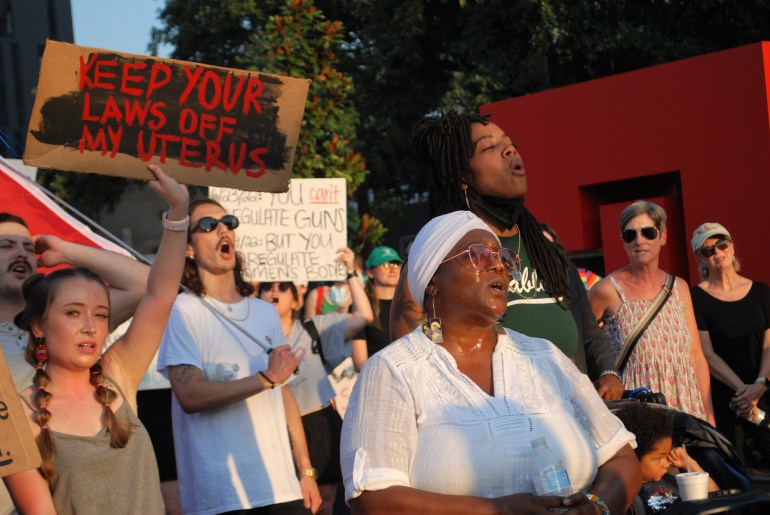
‘Abortion is not going anywhere’
The evening of the day the decision was announced, roughly a thousand protesters gathered outside the Fifth Circuit Court of Appeals in New Orleans and marched to City Hall, chanting, “abortion is healthcare.” Speakers pointed to those who would be especially severely affected by the ban. One woman stepped up and said, “I’m from Honduras, and I got an abortion in December.” An older man from NOLA Advocates for Abortion Rights recalled being 14 when the original Roe v Wade ruling came down.
New Orleans District Attorney Jason Williams also spoke to the crowd, saying he would not “criminalise” abortion, and indicating his office will not prosecute doctors or patients. Organisers have asked the mayor’s office and New Orleans Police Department to make the same pledge. They have also asked local hospitals not to report patients with signs of self-induced abortion, and asked that none of these groups cooperate with Louisiana State Police.
The mayor’s office and the New Orleans Police Department – along with LCMC Healthcare, a non-profit network of healthcare providers in southern Louisiana, and Ochsner Hospitals, the largest non-profit healthcare system operating in the state – did not respond to requests for comment by the time of publication.
On Monday, a judge granted a temporary restraining order, blocking the ban from proceeding. “For now, we are resuming procedures,” said Kathaleen Pittman, the Shreveport clinic’s exhausted administrator. “Some of these women have been waiting weeks to get in.” On July 8, a judge at the New Orleans District Court will decide whether the trigger laws are constitutional.
As clinics here shutter, non-profits like NOAF and local reproductive justice organisation Lift Louisiana will likely be the only ones left on the ground helping patients access care elsewhere. Medical professionals like Russell-Brown will have to find jobs in a new field, or go elsewhere to continue facilitating abortion services.
It’s a choice Simi herself anticipates facing someday. “I’m torn. Do I go to a state where abortion is legal and help the women that need those services? Or do I stay in a state where it’s not legal, and do my part in advocating for change?”
Wherever she ends up, she’s determined to support women who are seeking the services she received five years ago. “If it was up to me,” she says, “I’d personally drive each of these women to an abortion clinic myself. Abortion is not going anywhere. Abortions will continue to happen. Only safe abortions will be fading out.”
*Name has been changed at the request of the interviewee.